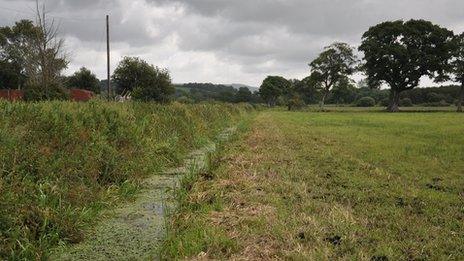Somerset Wildlife Trust secures wetlands for wildlife
- Published

The wildlife trust is working with farmers to make the levels more wildlife friendly
Farmers on the Somerset Levels have begun working on a nature project to make their farmland more wildlife friendly.
In 2009, Somerset Wildlife Trust (SWT) started contacting landowners to encourage them to adopt more wildlife-friendly ways of farming.
This has included felling trees along ditches and leaving farmland with raised water levels during the winter months for migratory birds.
Over the past three years, about 650 hectares (1,600 acres) has been secured in this way and farmers are now being helped to apply for grants to carry out the necessary work.
Project manager, David Leach, said: "Over that three years, we've carried out over 400 farm visits, and we've put a number of farmers into these grant schemes.
"Over the next 10 years, that'll bring in over £3.5m into the local economy."
Higher water levels
Much of the project's work involves helping farmers with the paperwork to secure the grant money from Defra's environmental stewardship programme.
"Farmers are paid to accept higher water levels in the ditches and that keeps the field wetter and the fields become important for wintering birds and for breeding birds.
"So in winter you get species like pintail ducks and widgeon who come to the Somerset Levels and Moors from northern Europe and spend the winter here for safe roosting away from predators and places where they can feed.
"In spring, farmers can drop the water levels but the fields stay reasonably wet and they become important for breeding wader birds like snipe. They nest in the grass and they raise chicks who can feed in the soft soils around the ditches and gutters," said Mr Leach.

Roger Wilkins has begun a 10-year scheme to help protect wildlife such as wading birds and aquatic plants
Roger Wilkins, a beef farmer and cider maker in Mudgley, Wedmore, has signed up to a 10-year environmental stewardship scheme.
"We've done some of the ditch work down on the moors on the Somerset Levels, we've cut a few of the trees down and we've done about 30% of the ditching in the first year," said Mr Wilkins.
But this year's heavy rainfall over summer has stalled his conservation work.
"This summer we haven't been able to do anything because it's been too wet to get on the land but we managed to do some last winter because we had a fairly dry winter.
"But then we were hoping to do some in late summer, but we haven't been able to do the hay and silage-making so that ditching will have to wait a bit now," added Mr Wilkins.
Despite the weather related problems, SWT is continuing to try to get more landowners signed up.
The charity has also expanded its nature reserves by buying up more land to help wildlife.
But now the hope is to lobby government agencies to find a way to protect more land outside designated SSSIs (Sites of Special Scientific Interest).
"We're being asked to think about conservation on a landscape scale, but we're not able to work with farmers much outside of SSSIs because we don't have a government grant scheme available," added Mr Leach.
"We need to find a way of working with landowners between the SSSIs so we can work with bigger patches of land so wildlife can move through the landscape," he said.
- Published27 July 2012